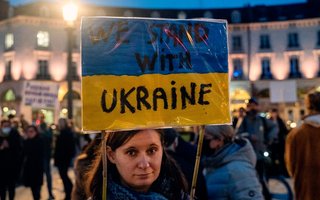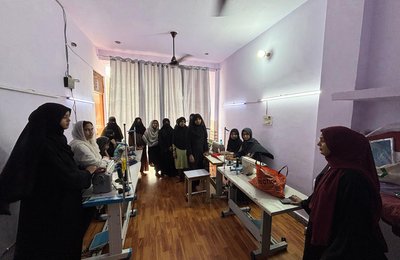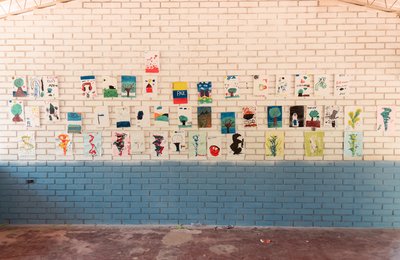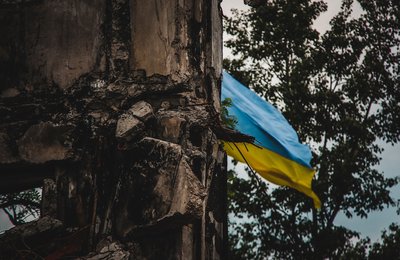Portraits from the War in Ukraine
Russia’s invasion of Ukraine on 24 February 2022 triggered an immediate, steep rise in humanitarian needs. Essential supplies and services were disrupted and civilians were forced to flee their homes. But international and local organisations responded rapidly to the outbreak of war: the next day, civil society organisations and volunteers within and beyond the borders of Ukraine were mobilising their resources and networks to help those affected.

To better understand local initiatives and shed light on the work of local peacebuilders, we produced a series of videos: “Portraits of the war in Ukraine” covering the first 6-9 months of the war. As well as highlighting the work of peacebuilders and volunteers who supported Ukrainians across Europe, we also heard from Ukrainian refugees about their experiences of the war, forced displacement and life abroad.
Committed support in Ukraine
Yaroslav Melnik, the head of Kyiv hub NGO “Spivdiia” responded to the war immediately, establishing the NGO with the support of the government. Yaroslav and his team started contacting their networks abroad to ask for humanitarian support to Ukraine.
They collect and disperse the aid through hubs across the country. Despite the dangerous situation, Yaroslav did not have even one thought to escape from Kyiv, because he felt the responsibility to help those who needed it.
Similarly, in the face of active hostilities, the Ukrainian Volunteer Service brings together volunteers from all over Ukraine to share their knowledge and services to support other war-affected Ukrainians.
Across the borders
In parallel, many Ukrainians fled the war to neighbouring countries. In the first days of the war, floods of refugees crossed into Poland. According to The Polish Border Guard data, a total of 5.9 million crossings from Ukraine to Poland was recorded between February 24 and September 1 2022.
I spoke with Monika Ekiert, a Polish humanitarian worker, about her experience of welcoming and hosting Ukrainians in Poland. She told me “I didn’t really ask myself this question why I decided to support humanitarian work. I was called for help and I went for it immediately without any hesitation.”
She continued, “My mum was ready to receive two Ukrainians at her house, but it was far away from the big towns, so nobody wanted to come. Also, my cousin opened a space to host the refugees at her school, she is school director”.
In many cases, refugees dispersed beyond Poland, across the European Union, where they were warmly welcomed by local volunteers. For example, Elena Valesco created the association 'Touraine-Ukraine’ in the first week of the war to welcome and support Ukrainian migrants in Loire Valley, France, with necessary aid, such as food, hygiene products and clothes. Now, the Association has re-focused on sending the most needed medicines, food, clothes and other items to civil society organisations still in Ukraine, like Spivdiia.
For me, it was touching to see how people like Monika and Elena have welcomed Ukrainians in France, Poland and everywhere, and helped them to find new life and to integrate. The foreign volunteers and organisations who opened their arms to Ukrainian refugees gave and received a lot of emotions and time to do this hard and demanding work. In return, Ukrainians appreciate the support of volunteers, civil society organisations and host governments.
Home from home
Another video portrait shares the story of Iliena Svetlana, a Ukrainian refugee. She had fled Mariupol, which was occupied from the first days of the war. For Iliena, 24 February 2022 started as normal, and she went to work in the morning. But she has not been home since.
During 4 months in occupation, her neighbours were killed and her house shelled and robbed. She fought for food and survival in terrible conditions, without electricity, water and gas, before she and her family finally evacuated to a safe place abroad.
The traumatic events that Iliena went through in Mariupol are heart-breaking. But in France, she feels “welcomed warmly there. [The] French Government provided the special residence status, medical insurance, monthly allowance and opportunity to learn [the] French language”. But she shared with me that she cannot wait to return to home in Mariupol, as soon as it is free from occupation.
For Iliena, at 55 years old, it is not easy to adapt to a foreign country without knowing the language. With this in mind, I wanted to know if integration would be easier for younger generations.
Among all the Ukrainians who came to France, I spoke to two Ukrainian teenagers, with two different characters, about their experiences integrating.
Teenagehood interrupted
Liiana and Makarii both turned 18 after fleeing the war in March and finding their way to Tours, France. Both have found their own ways to continue their life paths and follow their passions abroad.
Makarii, a very open and smiley young man, was a professional athlete in a rowing team in Ukraine. With the help of the Association of Ukrainians, he has joined a local professional rowing club in Tours, participated in the competitions and, at the same time, continued his studies.
Liiana, a more reserved young woman, continues her education in Ukrainian University remotely. She is a first-year student of Ukrainian language and literature, and she is taking French classes to enter French University to study Spanish next year.
Both Makarii and Liiana, and their families, would like to come back to Ukraine when peace and sovereignty is restored. Indeed, a recent United Nations refugee survey found out that the majority of Ukrainian refugees hope to return home as soon as possible.
For now, they are forced to set up a new life in France, and they are motivated to adapt to their temporary new home.
The stories of Iliena, Makarii and Liiana show that the integration and adaption process of war-affected Ukrainians abroad are easier for youth rather than older generation. But all Ukrainians who survived the active hostilities in Ukraine are emotionally struggling and/or traumatised, and are in need of further support – not only humanitarian aid, but also welcoming and inclusion in the local community.
Volunteers and civil society organisations, whether they are in Ukraine, France, Poland or elsewhere, are in need of further financial support and donations. The peacebuilding workers and volunteers also feel psychologically exhausted and disrupted by the war, and they too need some support and understanding.
From Polina at the Ukrainian Volunteer Service, here are some ways you can help.







